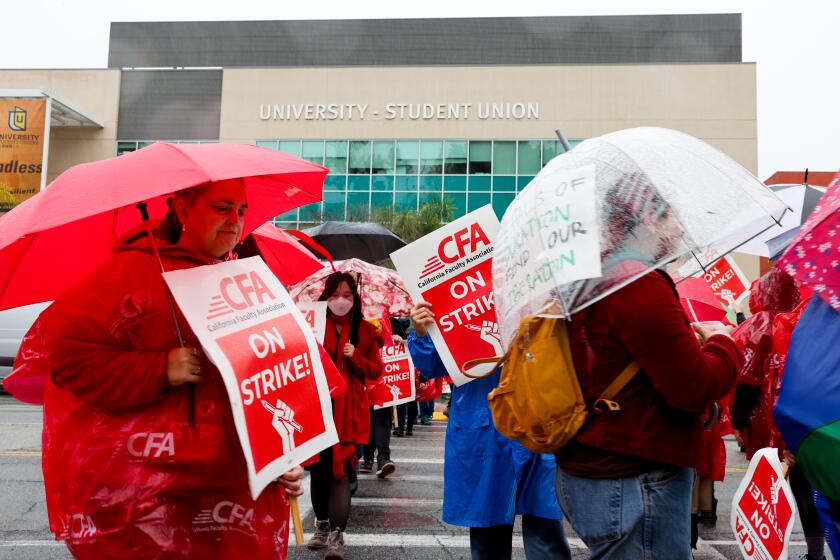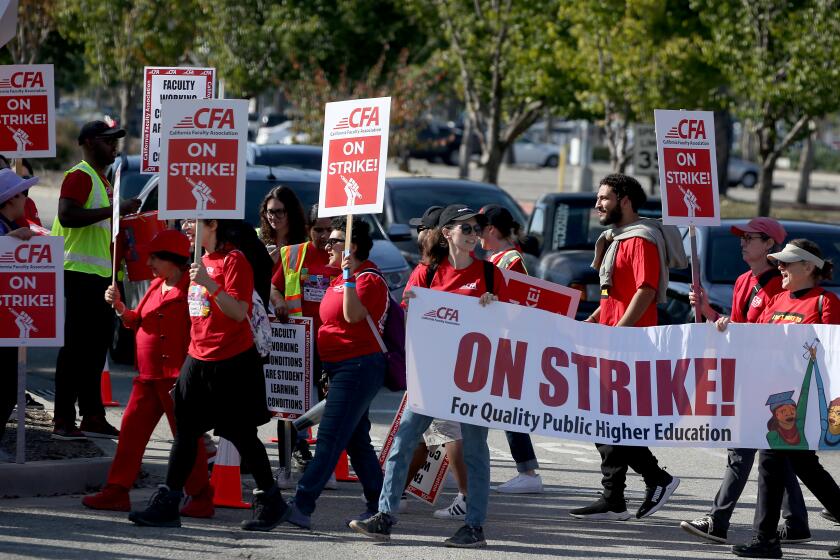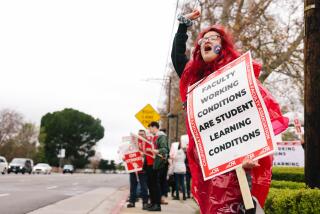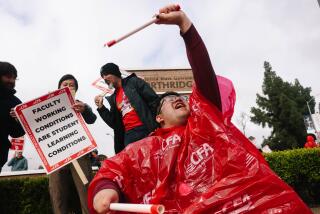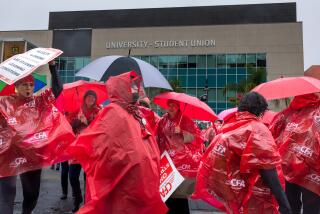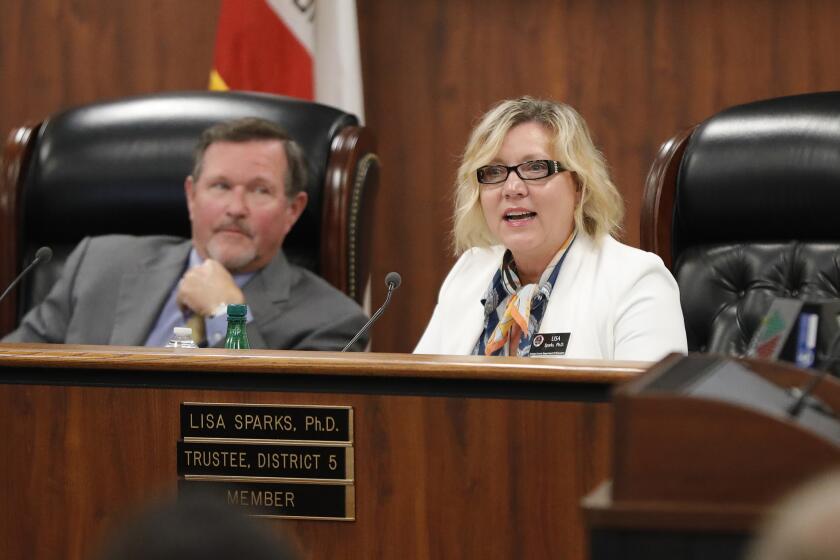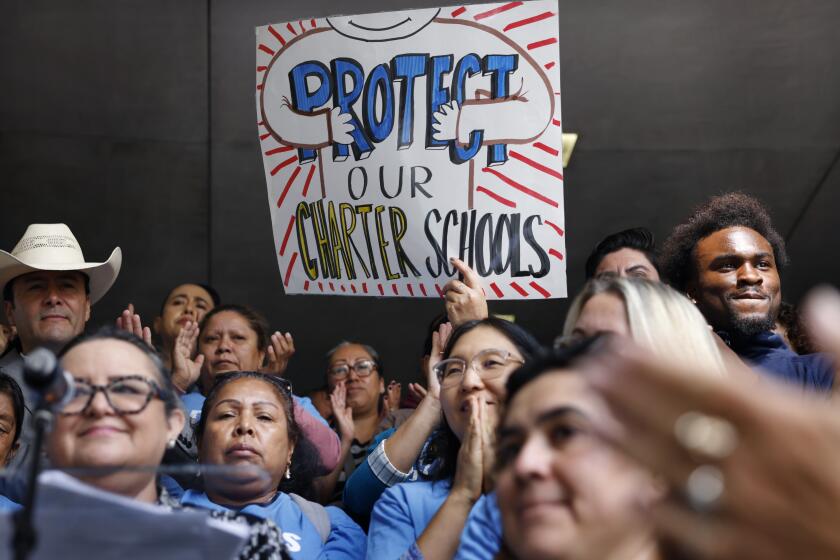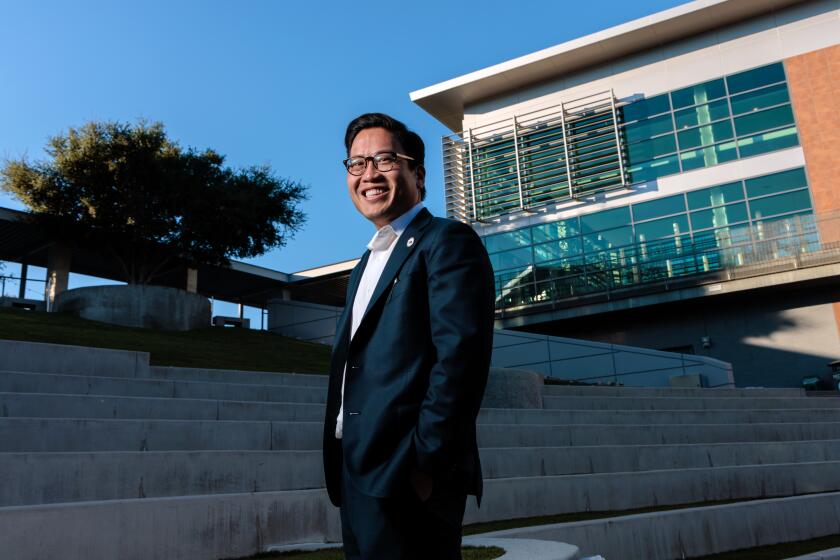After a stunted strike, CSU faculty union shows signs of division as it votes on contract
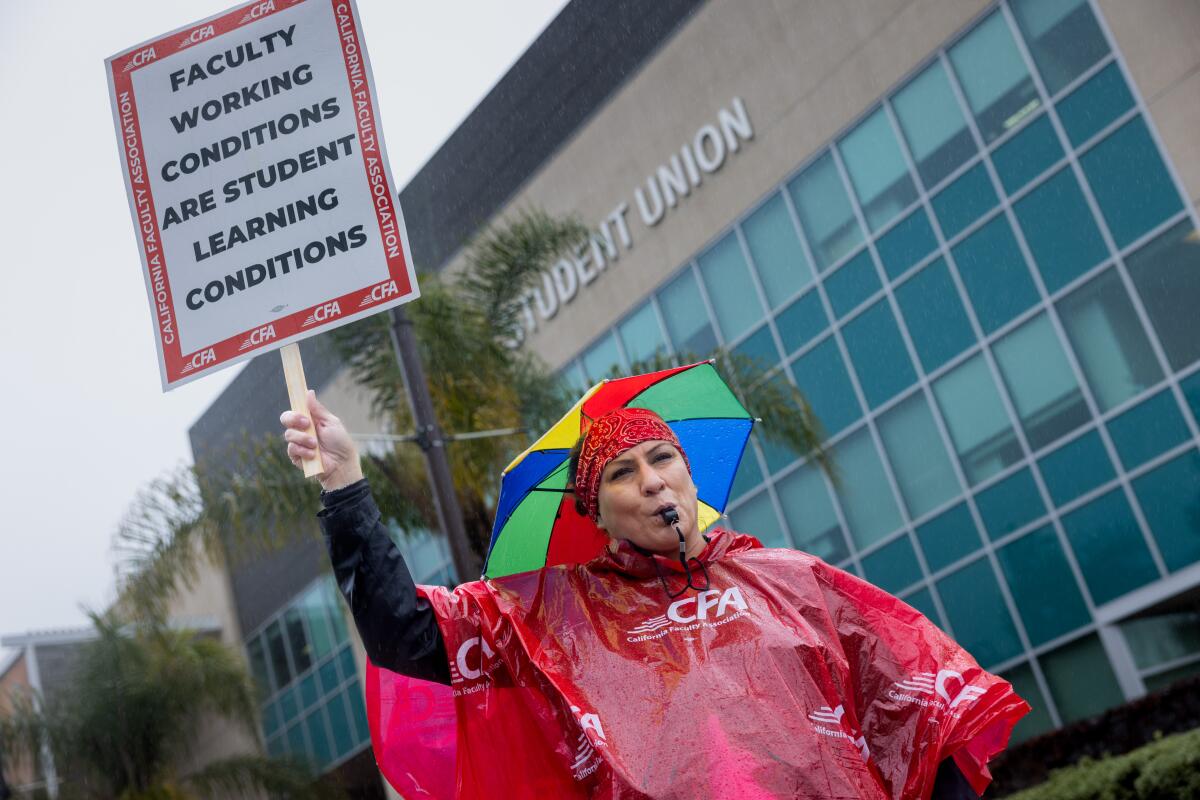
During an election season often marked by division, voting underway this week by Cal State faculty union members on a proposed contract is no exception — as a vocal faction has urged a no vote on what they believe is a rushed agreement that falls short of salary and benefit demands.
The tentative agreement with California State University includes a 5% raise for all faculty retroactive to July 2023 and another 5% raise that would take effect this July as long as the state does not cut base funding for the 23-campus system.
The proposed contract was reached after one day of a planned five-day, systemwide strike in late January that all but shut down classes in the nation’s largest four-year university system. The proposed contract also includes 10 weeks of paid parental leave, a salary floor increase for the lowest-paid faculty and improved access to gender-inclusive bathrooms.
The California Faculty Assn., which represents 29,000 faculty members, professors, lecturers, counselors, librarians and coaches, had demanded a 12% raise and a full semester of parental leave, among other benefits.
With faculty members prepared to strike for the week, the quick agreement accepted by union executives took many members by surprise. Union members were notified that night via email that the strike had ended.
Statewide union leadership and some campus chapters praise the agreement as a victory and say they are confident it’s the best deal possible and will pass with the simple majority vote needed.
“I’m pretty confident based on all the conversations that I’ve had that the tentative agreement is strongly supported across the union, even if that isn’t what it sounds like,” said Meghan O’Donnell, a union board member and part of the core bargaining team.
Among the 23 CSU schools, only a smattering of courses were taught on the first day of the term. A tentative contract deal has cut short the strike.
But many union members who were not directly involved in the bargaining process see significant shortcomings. They have been organizing across campuses, urging a no vote.
“We believe that accepting this deal leaves our economic and social-justice issues inadequately addressed, lets CSU off the hook with no systemic change, and fails to protect our students’ right to an accessible, affordable, high-quality education,” the Vote Down website says.
“I felt that we were only just getting started in our power,” said Robin Dodds, a professor at California State L.A. who is involved with a campaign on her campus to vote no on the agreement. “I would prefer to go back to the bargaining table and continue to do better for the union.”
Dodds wanted the agreement to include additional mental health counselors, higher salary floor increases and more meaningful action on gender-inclusive facilities, she said. Her campus union chapter is one of four that has issued an official statement against the agreement.
The union chapter executive boards at CSU Long Beach, CSU San Bernardino and San Francisco State University issued similar statements. On those campuses and others, many rank and file union members are frustrated with union leadership for cutting the strike short and characterizing the tentative agreement as a win.
“We’re seeing our classes get bigger, our workload increasing and our salary not keeping up with inflation,” said San Jose State University professor Sang Hea Kil. “There is no victory here.”
During week-long, rolling walk-outs at four California State University campuses, faculty highlighted the tenuous working conditions of lecturers, who are a backbone of instruction but ineligible for tenure.
San Jose State University lecturer Andrew Delunas supports the tentative agreement and said he resents the attitude of those who don’t, signaling fractures within the union.
“It’s a give and take but it is an extremely good contract and it’s the culmination of 10 months of extremely hard work,” Delunas said. “The side that’s naysaying this agreement is casting spit on our efforts.”
The salary raise, a 10% increase over two years with 5% contingent on normal state funding, is a win for the union, he said. He also praised the parental leave and said the agreement “immensely” benefits part-time lecturers like himself.
The first-ever strike followed months of tension between the union and CSU management over so-called reopener bargaining — when certain terms of an existing contract can be negotiated prior to the contract’s expiration. The current contract will end in June unless the tentative agreement is approved, which would extend it to June 2025.
If the tentative agreement is not approved, Cal State officials will not be required to come back to the bargaining table, said O’Donnell. It’s possible the union would strike again in an attempt to open negotiations, she said.
For the record:
3:48 p.m. Feb. 16, 2024A previous version of this arcticle said several CSU concessions were not on the table before the January strike. Access to lactation spaces and the right for faculty to request union support when interacting with law enforcement had been under negotiations before the walkout.
O’Donnell said she believes the current tentative agreement is as good as it’s going to get. It includes concessions from management that the union had pushed for, including access to lactation spaces and the right for faculty to request union support when interacting with law enforcement.
She also said Cal State has contract agreements with other unions called “me-too” clauses that require the university to reopen negotiations if another bargaining unit receives better terms. The Teamsters union, for instance, which recently finalized a new contract with Cal State, has a me-too provision.
“If the faculty were to actually get a general salary increase that was greater than 5% for 2023, the CSU would have to renegotiate all the salary contracts that they had just settled with all the other staff unions,” O’Donnell said. “The CSU made it very clear that was a hill they were going to die on.”
The CSU office of the chancellor declined to comment on the voting process.
“As the agreement is still tentative and union members are voting currently, it would be inappropriate” to comment, communications director Amy Bentley-Smith wrote in an email.
Results of the union vote will be announced Monday. Despite the opposition, O’Donnell said she is optimistic about the tentative agreement and the future of the union — and said the no-vote contingent reflects an engaged union membership.
“It really shows how passionate and engaged faculty are over this process and over improving our working conditions,” she said.
Those against the tentative agreement said they weren’t sure if they represent a majority of votes, but said their dissatisfaction runs deep.
“I don’t know how extensive the campaign is,” Dodds said. “But I know that the people who are involved in it are really passionate about improving our union so that it really does represent the rank and file membership.”
More to Read
Start your day right
Sign up for Essential California for news, features and recommendations from the L.A. Times and beyond in your inbox six days a week.
You may occasionally receive promotional content from the Los Angeles Times.

